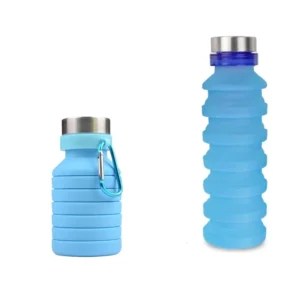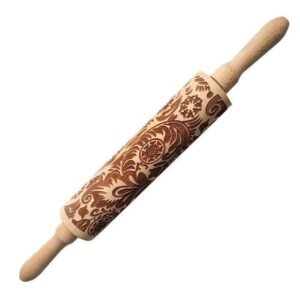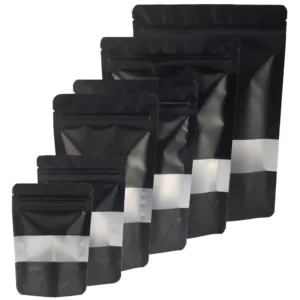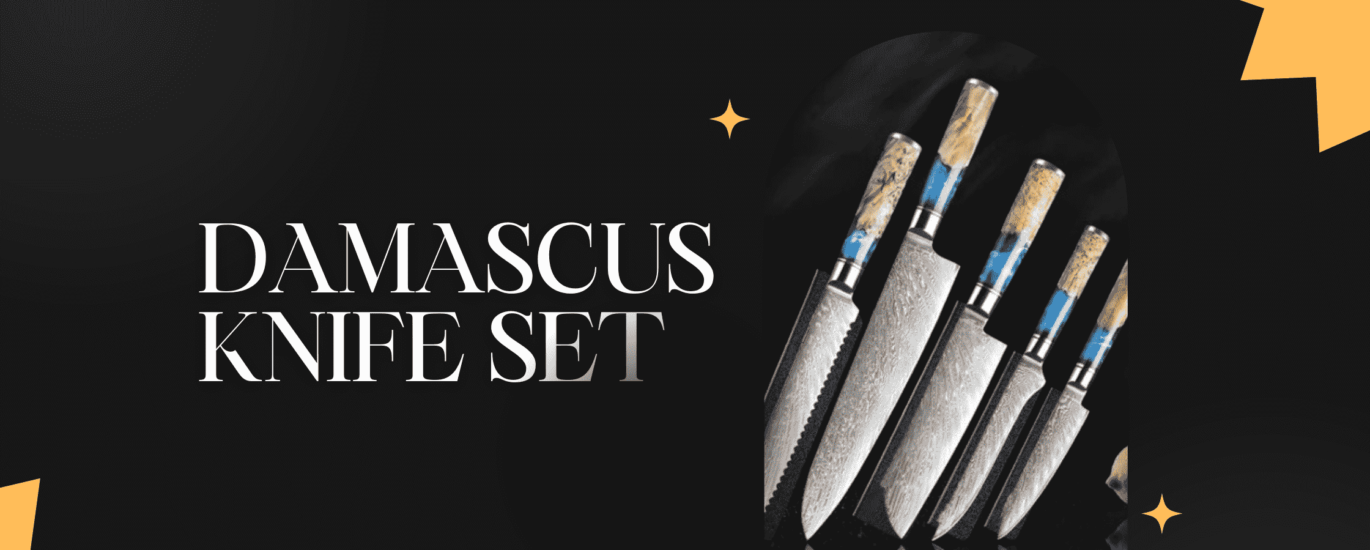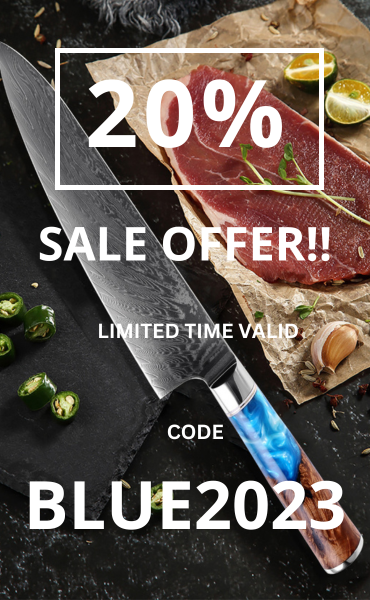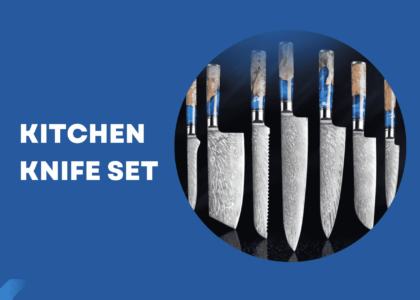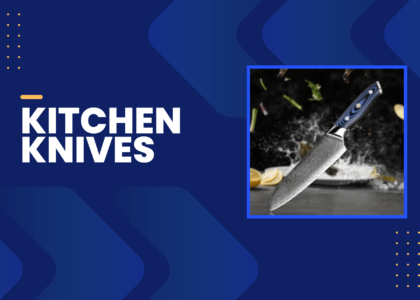Introduction
Damascus steel, renowned for its distinctive patterns and legendary sharpness, has been a symbol of quality in blade crafting for centuries. The Damascus knife set not only brings aesthetic and historical significance to modern kitchens but also offers a top-tier culinary experience.
- Importance and Uniqueness of Damascus Knife Set in Modern Kitchens The Damascus knife set is not merely a collection of cutting tools but a blend of art, history, and functionality. Here’s why it stands out:
- Artistic Appeal: The wavy patterns on Damascus steel are unique to each blade, offering not just a tool, but a piece of art.
- Historical Significance: Originating from ancient sword-making techniques, owning a Damascus knife set is like preserving a piece of history. Learn more about its rich history on Wikipedia.
- Unparalleled Quality: Known for its durability, sharpness, and resistance, Damascus steel provides a superior cutting experience.
- Prestige: Having a Damascus knife set is often seen as a mark of a serious cook, elevating the status of the kitchen.
| Feature | Detail |
|---|---|
| Material | Damascus Steel |
| Pattern | Unique, wavy |
| Sharpness | High |
| Durability | Long-lasting |
| Historical Use | Weapon crafting |
In the realm of culinary arts, a Damascus knife set is not just a mere tool; it’s a testament to timeless craftsmanship and a beacon of quality and prestige. Whether you’re a professional chef or a culinary enthusiast, having a set of cutlery in your kitchen signifies a commitment to quality and a nod to the rich history of blade-making.

The Evolution of Damascus Kitchen Knives
Damascus kitchen knives have a rich history that dates back centuries. These knives are known for their distinctive patterns and exceptional sharpness. Over time, the manufacturing techniques and materials used to create these knives have evolved, resulting in the high-quality blades we see today.
Traditional Damascus Knives
- Handcrafted using a technique called pattern welding
- Made by layering different types of steel together
- Resulted in a blade with a unique pattern and excellent cutting performance
Modern Damascus Knives
- Utilize advanced manufacturing processes and technology
- Made from high-quality stainless steel or carbon steel
- Incorporate the traditional pattern welding technique to create the characteristic Damascus pattern
Improved Durability and Performance
- Modern Damascus knives are more durable and resistant to corrosion
- Enhanced blade hardness and edge retention
- Improved ergonomic designs for comfortable and precise cutting
Specialized Damascus Knives
- Different styles and shapes for specific culinary tasks
- Chef’s knives, Santoku knives, paring knives, and more
- Customizable options for handle materials, blade lengths, and patterns
Rising Popularity
- Growing interest in artisanal craftsmanship and unique kitchen tools
- Damascus knives are highly sought after by professional chefs and cooking enthusiasts
- Increased availability and variety in the market
The evolution of Damascus kitchen knives has led to the creation of high-performance blades that combine traditional craftsmanship with modern technology. These knives offer exceptional cutting performance, durability, and aesthetics, making them a prized possession for any culinary enthusiast.
Exploring Various Damascus Knife Sets
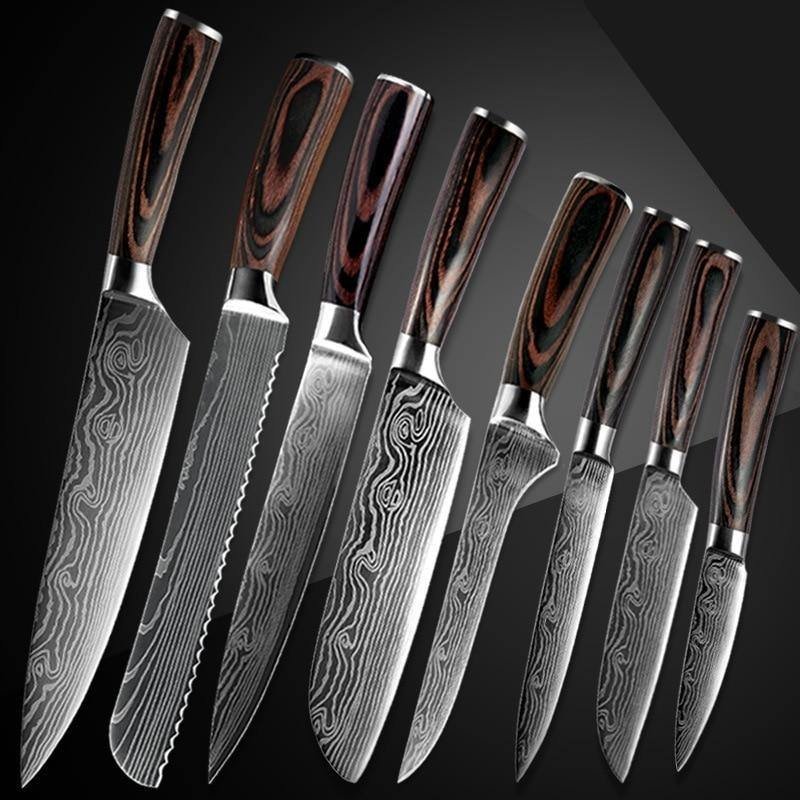
When it comes to Damascus knife sets, several brands, including hexclad series, have carved out a niche with their exceptional offerings in knives and cutlery. Home chefs love hexclad for its high-quality products. Shun, for instance, is celebrated for its traditional Japanese craftsmanship and aesthetic appeal. Miyabi, on the other hand, is revered for its precision and use of SG2 micro-carbide powder steel. Each brand brings something unique to the table, ensuring that every Damascus knife set is a confluence of art and utility.
Components of a Standard Set
A typical Damascus knife set encompasses a variety of blades to cater to diverse culinary needs. Common components include:
- Chef’s Knife: A versatile tool for various cutting tasks.
- Paring Knife: Ideal for peeling and other small-scale tasks.
- Bread Knife: Designed with a serrated edge to slice through bread without crushing it.
- Utility Knife: A multipurpose knife that fills the gap between a chef’s and a paring knife.
| Knife Type | Common Use | Typical Size |
|---|---|---|
| Chef’s Knife | Multipurpose | 8-10 inches |
| Paring Knife | Peeling, trimming | 3-4 inches |
| Bread Knife | Slicing bread | 7-10 inches |
| Utility Knife | Slicing, chopping smaller items | 4-7 inches |
Specialty Knives and Their Uses
Beyond the standard set, specialty knives in Damascus knife sets might include:
- Santoku Knife: A Japanese knife for slicing, dicing, and chopping.
- Boning Knife: Specifically designed to debone meat and poultry.
- Filleting Knife: Tailored for filleting fish with precision.
These knives cater to specific tasks, ensuring that the culinary expert has the right tool for every application, enhancing efficiency and precision in the kitchen.
Pricing and Availability
Investing in a Damascus knife set can be a significant expenditure, given the high-quality materials and craftsmanship involved. Prices can range widely based on the brand, materials, and number of pieces in the set. Availability might be through brand websites, exclusive stores, or select online retailers.
Why Choose Damascus Chef Knives for Your Kitchen?
When it comes to choosing chef knives for your kitchen, Damascus knives are an excellent choice. These knives are renowned for their superior quality and craftsmanship, making them a favorite among professional chefs and cooking enthusiasts alike. Here are some reasons why you should consider Damascus chef knives for your kitchen:
Exceptional Sharpness: Damascus knives are known for their razor-sharp blades, allowing for precise and effortless cutting. The multiple layers of high-quality steel create a fine edge that stays sharp for longer periods.
Durability: Damascus knives are incredibly durable and resistant to wear and tear. The layering technique used in their construction provides strength and flexibility, ensuring that they can withstand heavy use without losing their sharpness or integrity.
Beautiful Aesthetics: Damascus knives are not only functional but also visually stunning. The distinctive patterns created by the layering of different types of steel make each knife a unique work of art. They add a touch of elegance to any kitchen.
Versatility: Damascus chef knives come in various shapes and sizes, making them suitable for a wide range of kitchen tasks. From slicing and dicing to chopping and mincing, these knives can handle it all with precision and ease.
Excellent Balance: Damascus knives are well-balanced, providing optimal control and comfort during use. The ergonomic handles and the weight distribution of these knives make them a pleasure to work with, reducing hand fatigue.
Factors to Consider When Buying a Damascus Knife Set
Authenticity of the Damascus Pattern
Ensuring the authenticity of the Damascus pattern is pivotal when purchasing a Damascus knife set. Genuine Damascus steel exhibits intricate, wavy, or swirling patterns, each unique to its forging process. Counterfeits may display superficial patterns that lack the depth and uniqueness of authentic Damascus.
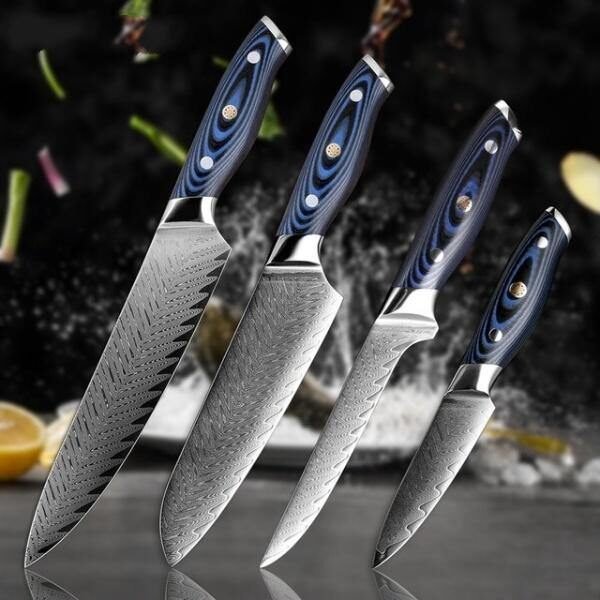
Steel Quality and Type
The quality and type of steel significantly influence the durability and performance of a Damascus knife set. High-quality sets often utilize VG-10 or high-carbon steel, renowned for its sharpness, durability, and corrosion resistance. It’s crucial to explore the steel type and its properties to ensure it aligns with your culinary needs and expectations.
| Steel Type | Characteristics | Common Use |
|---|---|---|
| VG-10 | Sharp, durable, and corrosion-resistant | Premium knives |
| High-Carbon | Hard, sharp, and somewhat brittle | Professional knives |
Handle Material and Design
The handle material and design of a Damascus knife set are crucial for ensuring comfort and safety during use. Preferred materials include:
- Pakkawood: Durable and moisture-resistant.
- Micarta: Lightweight and sturdy.
- G-10: Known for its excellent durability.
Ergonomic designs that fit well in the hand, providing a secure grip, are vital to prevent accidents and facilitate ease of use.
Price vs. Quality
While a Damascus knife set can be a substantial investment, balancing price and quality is key. High-quality sets might command a premium price, but they also bring unparalleled sharpness, durability, and aesthetic appeal to the culinary experience. It’s essential to weigh the long-term benefits, such as longevity and performance, against the initial investment.
Maintenance and Care of Damascus Knife Set
Sharpening Techniques and Tools
Maintaining the sharpness of a Damascus knife set is paramount to ensuring longevity and optimal performance in the kitchen. The intricate patterns and high-quality steel of Damascus knives require particular attention and specific tools for sharpening to preserve their unique characteristics.
- Honing Rods and Whetstones Utilizing honing rods and whetstones can effectively maintain the sharpness of your Damascus knife set. Honing rods realign the blade’s edge, while whetstones grind away metal to reveal a new, sharp edge. Both tools are essential in a well-maintained kitchen to uphold the performance of your knives.
- Professional Sharpening Services Engaging professional sharpening services ensures that your Damascus knife set is cared for with expertise and precision. Professionals utilize specialized tools and techniques to sharpen your knife set without compromising the distinctive Damascus pattern.
Storage and Handling
Proper storage and handling of a Damascus knife set, including knives, are crucial to preserving their quality and appearance and ensuring safety in the kitchen.
- Importance of Knife Blocks and Magnetic Strips Knife blocks and magnetic strips not only provide a safe storage solution but also protect the blades of your Damascus knife set from damage. Ensuring each knife in a set has a dedicated slot or space prevents the knives from rubbing against other utensils, preserving the sharpness of the knives and the integrity of the Damascus pattern.
- Handling Tips to Prevent Damage Correct handling involves using a pinch grip for stability and control, ensuring the knives are used on suitable cutting surfaces, and avoiding practices that could damage the blade, such as using them to cut frozen food. Proper handling of knives ensures the longevity and sustained performance of your Damascus knife set.
Conclusion and Final Thoughts
In wrapping up, a Damascus Knife Set embodies a sublime blend of artistry, history, and culinary excellence. Knives are at the heart of this set, showcasing their artistry and history while enhancing culinary excellence. Investing in one not only elevates your cooking experience but also brings a piece of historical craftsmanship into your kitchen. May your culinary adventures be enhanced by the unparalleled quality and aesthetic splendor of Damascus steel.
FAQs
What Makes Damascus Steel Unique?
Damascus steel captivates with its distinctive, wavy patterns and boasts a reputation for exceptional sharpness and durability, originating from ancient forging techniques.
How to Care for a Damascus Knife Set?
Ensure your Damascus knife set maintains its excellence by utilizing appropriate sharpening tools, providing secure, safe storage, and adhering to hand-washing practices.
Are Damascus Knife Sets Worth the Investment?
Absolutely, Damascus knife sets are worthwhile investments, offering unparalleled sharpness, durability, and a unique aesthetic appeal that enhances the culinary experience.
How to Differentiate Between Genuine and Fake Damascus Patterns?
Identifying genuine Damascus involves examining the steel patterns for depth and uniqueness, ensuring they are intrinsic to the metal and not superficially etched.
Are Damascus Knives Good Quality?
Yes, Damascus knives are celebrated for their exceptional quality, offering a blend of sharpness, durability, and a distinct aesthetic that is highly valued in culinary circles.
Why is a Damascus Knife So Expensive?
The high cost of a Damascus knife is attributed to the intricate manufacturing process, quality materials, and the exceptional performance and aesthetics it offers.
Are Damascus Blades Expensive?
Yes, Damascus blades tend to be expensive due to their complex manufacturing process, high-quality materials, and the exceptional durability and sharpness they provide.
Is Damascus Steel Expensive?
Indeed, Damascus steel is expensive, reflecting its superior quality, the meticulous forging process, and the rich history and aesthetics embedded in every piece.
Frequently Linked Pages
1. Damascus Knives Set – Unlocking the Secrets of Damascus Knives Set: A Comprehensive Guide
2. Best Damascus Knives – Discovering the Best Damascus Knives: A 2023 Guide to Top-Quality Craftsmanship
3. Damascus Kitchen Knife – Unlocking the Elegance of Culinary Art: An In-depth Exploration of Damascus Kitchen Knife


